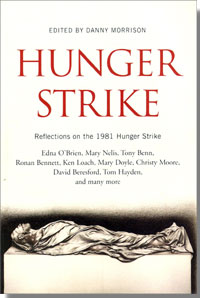16 November 2006 Edition
Review - Danny Morrison is the editor of a book of reflections on the 1981 Hunger Strike

Edited by Danny Morrison.
Published by Brandon.
The depth of the lasting impact made by the 1981 Hunger Strike is evident in this fine collection of reflections from 49 contributors compiled, edited and introduced by Danny Morrison. Writers, artists and activists write pieces short and long, including essays, memoirs and poetry, some from '81 itself, most written especially for the book.
Contributors include Edna O'Brien, Ken Loach, Christy Moore, Tony Benn, Rita O'Hare, Ronan Bennett and many more. I especially enjoyed the pieces from the three Marys - Mary Nelis's hard-hitting 'Ordinary People' about the campaign in Derry, Marie Moore on 'Smuggling the Comms' and the indomitable Mary Pearson's 'Marching in England'. It is fascinating to see the impression made by the Hunger Strike on so many diverse individuals who are able to express it so well. People stood in awe at the determination of the young republicans in the H-Blocks to carry through their protest to the death. We were humbled, inspired and activated.
It is now commonly asserted that the 1981 Hunger Strike led to the peace process and the electoral rise of Sinn Féin. This is far too simplistic an assertion and it actually underestimates the true extent to which the Hunger Strike impacted on Irish republicanism. For every activist convinced by 1981 of the need to develop electoral politics there was at least another new activist recruited to the IRA and fully convinced that armed struggle was essential to end British rule in Ireland. Of course these two positions were not mutually exclusive and the immediate political legacy of the hunger strike was the strategy articulated by Danny Morrison in his famous ballot box and armalite speech.
By the tenth anniversary of the Hunger Strike the limitations of the ballot box and armalite strategy were clear. Danny Morrison himself wrote as much April 1992 in a column for this paper entitled 'A Bitter Pill' (reprinted in Then the Walls Came Down by Danny Morrison, Mercier, 1999) on the realities republicans needed to face after Sinn Féin lost the West Belfast seat. I was editor of An Phoblacht at the time and did not publish the piece. I told Danny I agreed with 99% of what he had written. But it was ahead of its time and would have been seized on by our enemies. I believed the internal upheaval it would have caused would have outweighed whatever good such a stark and frank piece might have done.
Much of what Danny wrote in that piece was being said among some republicans at the time. But in a struggle under constant siege it is very difficult to question strategies which have hardened into principles. In many minds armed struggle hardened into a principle, an end in itself, and it took time to change that. What was needed was the space to see beyond the smoke of the immediate battle. It was necessary to remember what US imperialist Henry Kissinger wrote of the Vietnam War: "The guerrilla wins if he does not lose; the conventional army loses if it does not win."
Clearly the British could not win in their effort to crush Irish republicanism. They failed in the H-Blocks in '81 and they failed in their counter-insurgency war thereafter. Neither could the IRA drive the British into the sea. But they could win in the sense of surviving and creating the political space for Irish republicanism to advance by other means. And in that sense the IRA won, just as the hunger strikers won.
After the hunger strike the H-Block prisoners adopted new strategies, undermined the prison system from within, won their demands and more. They were flexible and agile, while adhering to republican principles. On the outside republicans talked a lot about building mass support. We did the same at the start of the peace process. We recognised that Sinn Féin alone could not bring about Irish reunification. It is vital not to lose sight of the need to build wider popular support that is not confined to electoralism and participation in institutions. The republican message strikes a deep chord with Irish people and friends of Ireland as the breadth of contributors to this book demonstrates. The point is to convert that support into real political strength.
By
MíCHEÁL Mac DONNCHA


